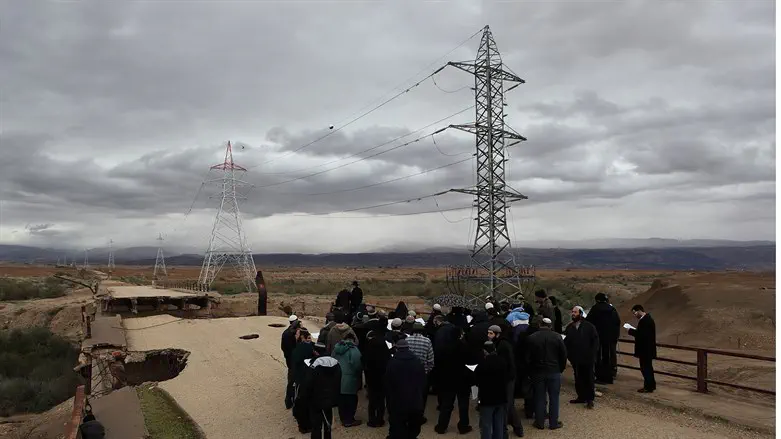
We read in our Parasha of the events leading to the decree, that Moshe and Aaron are not to enter the Land:(20:1-12)’ The children of Israel arrived at the Wilderness of Zin..Miriam died there; There was no water for the assembly, and they gathered against Moshe and Aaron..saying: ‘If only we had perished as our brethren perished..Why did you bring us up from Egypt to this evil place..and there is no water to drink’.
"Hashem spoke to Moshe saying:’Take the staff and gather together the assembly, you and Aaron your brother, and speak to the rock before their eyes and it shall give its waters..Moshe took the staff..as He had commanded him..gathered the congregation before the rock and said to them:’Listen now O rebels, shall we bring forth water for you from this rock?’. Then Moshe raised his arm and struck the rock with his staff twice; abundant water came forth and the assembly and their animals drank."
"‘Hashem said to Moshe and Aaron:’Because you did not believe in Me to sanctify Me in the eyes of the Children of Israel, therefore you will not bring this congregation to the Land that I have given them’.
Rashi comments:’You did not believe in Me to sanctify Me in the eyes of the Children of Israel’:Had you spoken to the rock, and it had given of its waters, I would have been sanctified in the eyes of the assembly, as they would have said:If this rock, that does not speak nor hear, and does not need Me for its sustenance, obeys My word, how much more so, us’.
Asks Rabbi Yitzchak of Vorka:’Why, if Moshe transgressed in this matter, do we, in the Geshem prayer on Hoshana Rabba, ask Hashem to answer our supplication:’In the merit of the most trusted of the household (Moshe), who supplied the people with water, who struck the rock and there flowed water’?!
‘How could we ask that our prayer be accepted, in the merit of this transgression of Moshe, in striking the rock, instead of speaking to it, as Hashem had commanded?
‘The answer lies in the Rashi’ that we brought! ‘We learn from it, that had Moshe spoken to the rock, instead of striking it, and the rock given its waters, as it would have, THEN this would have been an indictment against Bnei Israel, that they, unlike the inanimate rock, did not heed Hashem’s Commandments.
‘Moshe Rabbeinu, in his unbounded love for his people, foreseeing in his prophetic powers of ruah hakodesh that they would, sadly, transgress in the future, to prevent this being held against them, chose to offer himself up, by transgressing, so that he, and not they, would be ‘at fault’.
‘It is this dedication, mesirut nefesh, that we claim as a merit, when praying for water, on Hoshana Rabba!’.
We can find an aid to this drasha, in the commentaries, that for the very same reason, Yona sought to avoid carrying out Hashem’s commandment to call the people of Nineveh to repent, out of his concern that, should they do so, as was likely, it would have been an indictment against Bnei Israel, for not heeding Hashem’s call to them, to repent.
Here we ask: If Moshe Rabbeinu chose to transgress, why did he strike the rock twice- would striking it once not have sufficed, so as to minimize his ‘disobedience’?
Answers Rav Pinchas Friedman:’Moshe Rabbeinu struck the rock twice as if expending his anger on it, as he wished to implore His Creator that, when He is wrought with Bnei Israel, He pour His wrath on stones, on the two Batei Mikdash, and not on his people.
‘Rashi, on the Gemara (Kiddushin 31:), notes the intriguing opening words of Psalm 79:’Mizmor L’Asaf:’G-d, the nations invaded your inheritance’- It should have stated ‘Kinah L’Asaf, Lament for Asaf. He expounded that Asaf said ‘a song’, because Hashem consumed His anger on wood and stone that was in His house, and because of this Bnei Israel survived; were it not so, there would not have been any Bnei Israel left’.
‘This was the ‘accession’ by Hashem, to the two strikes of Moshe Rabbeinu on the rock, at Mei Meriba’.
The Megale Amukot sweetens this wondrous ‘glimpse’ into the mesirut nefesh of Moshe Rabbeinu, from these events, writing:’Moshe had a great yearning to enter the Land, so as to build the Beit Hamikdash, but Hashem answered, that he would not be able to do so, because of our Sages teaching (Sotah 9.): Anything that Moshe Rabbeinu built, would be eternal, and could not be destroyed.
‘Therefore, had Moshe Rabbeinu entered the Land, and built the Beit Hamikdash, when Bnei Israel sinned, as they were wont to do, Hashem’s anger would not be consumed on it- on its sticks and stones - but on Bnei Israel.
‘In his great mesirut nefesh, Moshe Rabbeinu therefore sacrificed his great yearning to enter the Land, for the sake of his flock, and intentionally struck the rock, not once, but twice, for the reasons we advanced’.
A beautiful parting insight from Rav Friedman:’Literally read, it might appear that there was transgression and punishment in these events; in truth, there was neither. This is why, in Hashem’s final words:’therefore you will not bring this congregation to the Land’, the Torah uses the appellation of chesed, Hashem, and not the appellation of din, Elokim.
‘This is to denote ‘approval’ of Moshe’s actions. Sadly Moshe was compelled to strike the rock, as Bnei Israel were not at a level of Emunah that words to the rock would have moved them, and therefore Moshe was, through no fault of his, unable to ‘sanctify Me in the eyes of the Children of Israel’- but, sadly, therefore also, ‘you will not bring this congregation into the Land!’.
לרפואת נועם עליזה בת זהבה רבקה ונחום אלימלך רפאל בן זהבה רבקה, בתוך שאר חולי עמנו.